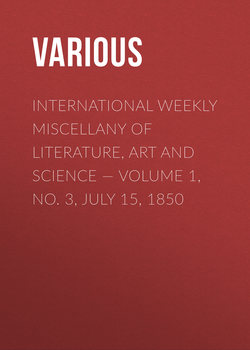Читать книгу International Weekly Miscellany of Literature, Art and Science — Volume 1, No. 3, July 15, 1850 - Various - Страница 3
MISS LESLIE'S LIFE OF JOHN FITCH
ОглавлениеIt has been announced for years that Miss Leslie—the very clever but not altogether amiable magazinist—was engaged upon a memoir of JOHN FITCH, to whom, it has always seemed to us, was due much more than to Fulton, the credit of inventing the steamboat. While Fitch was in London, Miss Leslie's father was one of his warmest friends, and the papers of her family enable her to give many particulars of his history unknown to other biographers. When several years ago. R.W. Griswold published his Sketches of the Life and Labors of John Fitch, the late Noah Webster sent him the following interesting letter upon the subject:
DEAR SIR:—In your sketch of John Fitch you justly remarked that his biography is still a desideratum. The facts related of him by Mr. St. John to Mr. Stone, and published in the New York Commercial Advertiser, are new to me; and never before had I heard of Mr. Fitch at Sharon, in Connecticut; but I know Mr. St. John very well, and cannot discredit his testimony any more than I can Mr. Stone's memory. The substance of the account given of Mr. Fitch by the indefatigable J.W. Barber, in his Connecticut Historical Collections, is as follows: John Fitch was born in East Windsor, in Connecticut, and apprenticed to Mr. Cheney, a watch and clock-maker, of East Hartford, now Manchester, a new town separated from East Hartford. He married, but did not live happily with his wife, and he left her and went to New Brunswick, in New Jersey, where he set up the business of clock-making, engraving, and repairing muskets, before the revolution. When New Jersey was invaded by the British troops, Mr. Fitch removed into the interior of Pennsylvania, where he employed his time in repairing arms for the army.
Mr. Fitch conceived the project of steam navigation in 1785, as appears by his advertisement. He built his boat in 1787. In my Diary I have myself noted that I visited the boat, lying at the wharf in the Delaware, on the ninth day of February, 1787. The Governor and Council were so much gratified with the success of the boat that they presented Mr. Fitch with a superb flag. About that time, the company, aiding Mr. Fitch, sent him to France, at the request of Mr. Vail, our consul at L'Orient, who was one of the company. But this was when France began to be agitated by the revolution, and nothing in favor of Mr. Fitch was accomplished; he therefore returned. Mr. Vail afterward presented to Mr. Fulton for examination the papers of Mr. Fitch, containing his scheme of steam navigation. After Mr. Fitch returned to this country, he addressed a letter to Mr. Rittenhouse, in which he predicted that in time the Atlantic would be crossed by steam power; he complained of his poverty, and urged Mr. Rittenhouse to buy his land in Kentucky, for raising funds to complete his scheme. But he obtained no efficient aid. Disappointed in his efforts to obtain funds, he resorted to indulgence in drink; he retired to Pittsburgh, and finally ended his life by plunging into the Alleghany. His books and papers he bequeathed to the Philadelphia Library, with the injunction that they were to remain closed for thirty years. At the end of that period, the papers were opened, and found to contain a minute account of his perplexities and disappointments. Thus chiefly the narration of Mr. Barber, who refers for authority to the American edition of the Edinburgh Encyclopedia. It may be worth while for some gentleman to attempt to find these papers. N. WEBSTER.
Rev. RUFUS W. GRISWOLD.
The papers to which Dr. Webster alludes in the above letter, have been examined by Miss Leslie, and the curious details they contain of Fitch's early life, his courtship, unfortunate marriage, captivity among the Indians, experiments, &c. will be embraced in her work, which will undoubtedly be one of the most interesting biographies of this country.
The director of the Museum of Paris has opened a very interesting gallery of American antiquities, from Yucatan, Mexico, Peru, Bolivia, and other countries of the New World.
